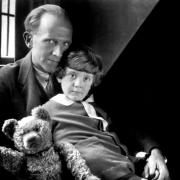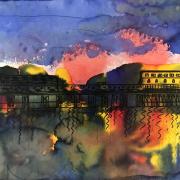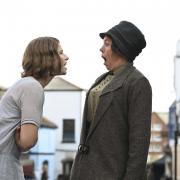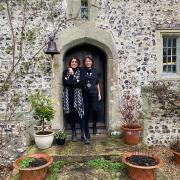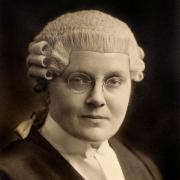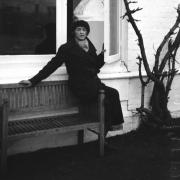Hollywood screenwriter, playwright and novelist William Nicholson is no stranger to success. But the writer of the smash films Shadowlands and Gladiator says it hasn't always come easy, not least when he tried to get his latest novel published.
With two Oscar nominations and a hatful of literary and theatre awards to his name, Hollywood screenwriter, playwright and novelist William Nicholson is no stranger to success. But the writer of the smash films Shadowlands and Gladiator says it hasn’t always come easy, not least when he tried to get his latest novel published. Angela Wintle meets him at his Sussex home
Every morning at 6am sharp, William Nicholson, the writer of Shadowlands and Gladiator, takes the short walk across the garden to his office, clutching a sheaf of papers and a piping mug of tea. He’s done this walk for well over a decade; every morning the same. But no day is the same. Rather like the fictitious children’s character Mr Benn, he adopts a different guise, depending on his deadline: sometimes, a children’s author; sometimes a Hollywood scriptwriter; other times a novelist of contemporary adult fiction.
“In any one month, I will be working on two – at the most three – different projects,” he says. “Sometimes I feel like a secret adulterer. My employers in the film business are unaware that I come to them trembling with the thrill of another world. But by breaking away and doing other work, I recharge my imagination and return with new enthusiasm.”
Nicholson and I are chatting in his sun-drenched summer room overlooking the garden. You can see his sharp intellect in his face. His domed forehead, imposing brow and close-set eyes all smack of intellectual rigour. And then there’s his measured, educated speaking voice, which brims with authority.
He and his wife, Virginia Nicholson, a fellow writer whose great aunt was Virginia Woolf, live in some style just outside Lewes in a beautiful Sussex farmhouse, parts of which date back to the 14th century. The Bloomsbury legacy is much in evidence. Quirky coffee cups hand-painted by Virginia’s late father, Quentin Bell, line the kitchen dresser; lampshades, decorated with bold swirling patterns, adorn the living room, designed by Virginia’s sister, Cressida. But this isn’t a stuffy house, packed with ‘precious’ objects. It’s an unpretentious family home.
“It’s a huge privilege to live in a place like this,” says Nicholson, gazing at his large pond and daffodil walk. “It’s an idyll and I’ve been able to do this courtesy of Hollywood. We feel that we aren’t the owners, we’re the current stewards, so it’s our duty to maintain it and eventually pass it on.”
Nicholson, 62, spent his early childhood in 1950s Seaford, betwixt “the health-giving” sea and Downs. The family moved into a house on Heathfield Road, though his father, a doctor, was absent for much of his childhood, working for the Leprosy Service in Nigeria.
“My childhood passed on foot and outdoors, in bracken and on pebbly beaches. There were no restrictions and Seaford was the perfect childhood scale. I had one friend, but one was enough. We were inseparable until I was sent to boarding school at the age of 11.”
Nicholson is an unstoppable force and has two novels out this year and is working on at least one screenplay. You get the distinct impression it all comes easily. He got a double first at Cambridge and has been gathering accolades ever since.
There have been Baftas for television plays, including Shadowlands (his account of CS Lewis falling in love), an Oscar nomination for his screen adaptation of that play, plus another for Gladiator – not to mention a Tony award for one of his acclaimed theatre plays and a clutch of prizes for his two teenage fantasy trilogies, The Wind on Fire and The Noble Warriors. Now he has turned his attention to adult novels. His latest, The Secret Intensity of Everyday Life, now out in paperback, was the runaway best-seller at the Charleston Festival last spring and the sequel will be published this autumn.
But here at least, the golden boy did come a little unstuck. The book, set in Sussex in the semi-countrified world of prep-school teachers, kindly vicars, TV producers and pushy parents, was not an easy sell – to publishers at least. Some dozen or so looked at it, but all turned it down on the basis that they couldn’t publish a book about ‘people who drive 4x4s’. Eventually, a small publisher called Quercus took it, which had previously taken a punt on a little-known novel called The Girl with the Dragon Tattoo.
Nicholson is mystified by the resistance. “There’s a feeling that the reasonably well-off middle classes have everything, so why give them the prestige of treating their lives as important? I take the exact opposite view – which is that every one of us, regardless of whether we live in comfortable houses, goes from glory to disaster in our minds all the time.”
Nicholson initially called the novel Countryville because he realised he was writing about a new kind of region. “It’s obviously not the city, but it’s not really countryside either in the sense that very few of us are actually making our living through the land. We’re nearly all urbanites living in the countryside and often commuting to the city.”
His novel opens with a letter. The recipient is Laura, a 40-something mother of two children in an ‘okay marriage’; the sender, her first love, whom she knew at 20. “That relationship was the powerful experience of her life. The boyfriend dumped her after a year and she never knew why. Now, he re-enters her life and she realises how intense her life used to be and how ordinary it is now. Is she living the life she’s meant to live? Has she settled for a half life?”
The story is set in the fictional village of Edenfield, loosely based on Beddingham, near Lewes, and weaves through the lives of 20 characters, who interact with each other without even realising it. Each chapter is from a different character’s viewpoint and the reader gets a God view of the way everybody interacts.
“One of the premises is that we all affect each other’s lives in ways that we just don’t realise. If we only understood what was happening inside other people, we’d behave differently. If someone shouts at you, you assume they don’t like you. What you don’t know is that they’ve just had a very stressful experience, which has nothing to do with you at all.”
Nicholson is often asked about his varied career – the novels, the plays, the films – but if he had to choose one discipline, it would be novels every time. He’s been trying to write the ‘perfect’ novel since he was 15. “I came out of Cambridge and got a job at the BBC as a general trainee, but all I wanted was to write novels. All through my years at the BBC, I rose before six and got in two hours on a book before going to work.” He produced no fewer than eight novels during that time, but they were as immature as their author, he says, and he failed to convince anyone of their merit. “In retrospect, it did me a lot of good. It beat me down and I ended up very humble.”
The breakthrough was writing for film. “There’s no doubt that my later novels have succeeded where my early novels failed because I learnt many storytelling lessons in Hollywood. No one in Hollywood cares about your voice or your sensibility. What they want is big characters, big stories, big audiences. Very smart people do nothing all day but beat writers into shape. And I was duly beaten into shape.”
It was Shadowlands, an award-sweeping hit on television, film and stage, which turned him into a Hollywood player. Since the early 1990s he has written innumerable scripts, including First Knight, Grey Owl, Nell and Elizabeth: The Golden Age. He’s currently working on 1066, Hollywood’s take on the life and times of William the Conqueror, though if it ever makes the big screen he doubts the Battle of Hastings scenes will be shot in Sussex. “My guess is that it will be filmed in middle Europe where there aren’t any electricity pylons.”
He’s also confident that his biopic based on Nelson Mandela’s autobiography, A Long Walk to Freedom, will finally be made into a film.“It’s been hanging fire for a long time, but it’s looking quite hopeful. It’s a tricky one, though, because who do you cast as the nine-year-old Mandela?”
Scriptwriting is lucrative, but frustrating. “It pays the bills handsomely, but it’s a mug’s game. You have no control over what you write and it can be taken from you without your cooperation. And a lot of films don’t get made. That’s heartbreaking.”
It’s not that people in the film business are bad, crass or stupid, he says, it’s simply that there’s an awful lot of money at stake. “It’s a cruel existence. I can work on something with all my heart and soul and find to my astonishment that I’ve been abandoned. But it’s never personal. And I’m grateful to the system because it pays well. I’m not going to bite the hand that feeds me.”
The novels are his way of clawing back control. “I use the films to finance the writing. The novels are my love; that’s where I started. They are me speaking with my voice. In film, you can’t lord it over everybody and they don’t let you. Whereas, when I’m writing a novel I write what I want to write.”
Nicholson scarcely needs the plaudits, so what drives this relentless creativity? Success for its own sake, ambition, posterity?
He smiles. “It’s none of those things. When you’re young, you do things for the money, fame and glory. As you get better at what you do, you start to be driven by something else. You have a vision of how it would be if you did it really, really well. Of course, you can never achieve perfection, but you do get closer to it. And that’s what’s driving me. Each work I finish, I think: ‘This is fantastic’. Then afterwards, I think: ‘Actually, it’s not. It’s imperfect. I didn’t quite get that as strong as it could be.’ But the next one will get that.”



